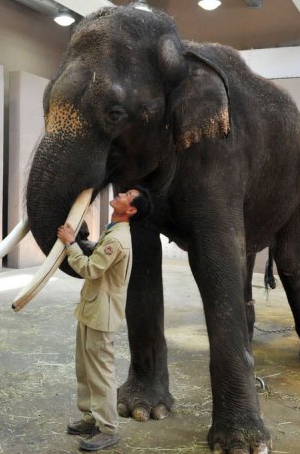An elephant who grew up at a S. Korean zoo has learned to modulate its normally low-pitched rumblings to utter five Korean words, according to a study published in the journal Current Biology.
Koshik, a 22-year-old who lives at the Everland Zoo in a Seoul suburb, can say the Korean words for “hello” (an-nyeong), “sit down” (an-ja), “no” (a-ni-ya), “lie down” (nu-wuh), and “good” (jo-ah).
The study’s lead author, Dr Angela Stoeger of the University of Vienna, verified the quality of Koshik’s verbalizations by asking native Korean speakers who had never before heard of Koshik to listen to recordings of the elephant’s verbalizations, then write down what they heard.
“We found a high agreement of the overall meaning,” said Stoeger.
“Human speech has two important aspects,” she explained. “One is pitch and one is timbre, and Koshik is matching both of these aspects,” Stoeger told the BBC.
That’s a remarkable feat considering the fact that an elephant’s extremely long vocal chords, combined with the length of its trunk — which correspond to lips in humans — produces deep rumbling sounds that are so low in pitch as sometimes to be below the range of human hearing.
To imitate the pitch and timbre of his trainer’s voice, Koshik devised a clever workaround — putting his trunk into his mouth as a way to modulate the oral chamber.
“We don’t have X-rays, so we don’t really know what is going on inside his mouth, but he’s invented a new way way of sound production to match his vocalizations with his human companions,” said Stoeger.
“If you consider the huge size of the elephant and the long vocal tract and other anatomic difference — for example he has a trunk instead of lips and a huge larynx — and he is really matching the voice pitch of his trainers, this is really remarkable.”
Researchers know of no other instance of such ability in an elephant. They don’t believe Koshik has any comprehension of the words he’s uttering. However, given the fact that Koshik apparently learned those words in connection with specific situations and actions — and given the degree of intelligence imputed to elephants — it’s likely Koshik has acquired some associations between the words and various situations (i.e. initial greeting, approval, rejection) and actions (sitting, lying down) — a close approximation of comprehension.
Koshik’s motivation for making the effort to imitate human speech was the desire to bond with his human companions, Stoeger believes. Koshik was the only elephant at Everland Zoo between the ages of five and 12, a period crucial in elephant development.
“Humans were his only social contact [during that period], and we believe Koshik is using these vocalisations as a function to strengthen the socials bonds with his companions, which are humans in this case,” explained Stoeger.
Trainer Kim Jong-gap has reported that Koshik could speak up to eight Korean words at one time. However, he lost some of his interest in speaking Korean since a female elephant arrived at the zoo.
Stoeger first learned of Koshik’s unusual ability after coming across YouTube videos depicting his verbalizations.


